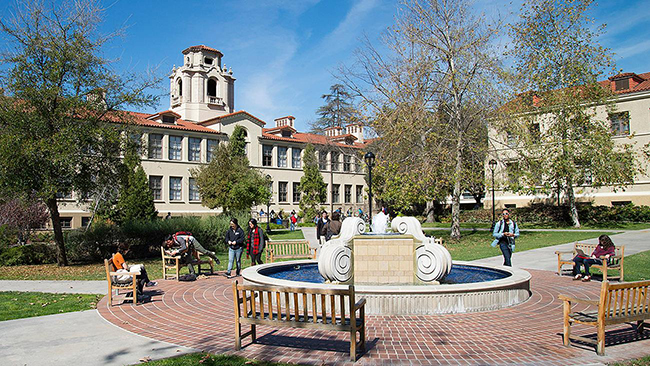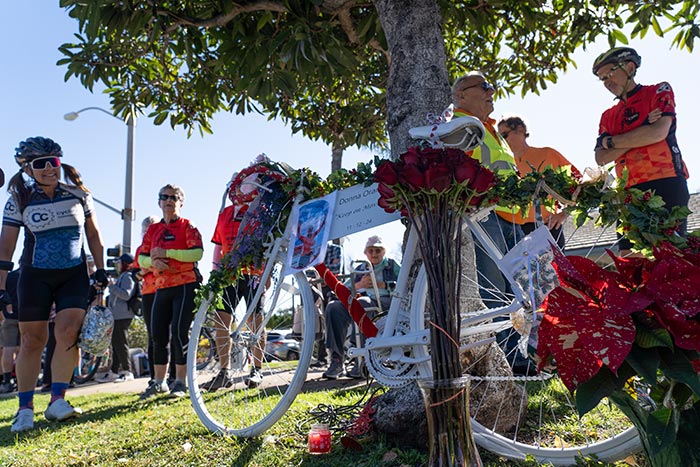Council hopefuls state their case at latest candidate forum
The Claremont city council hopefuls flexed their business acumen during the Chamber of Commerce candidate forum on Tuesday.
The early-morning forum, put on by the Claremont Chamber of Commerce, is one of six candidate forums this year, giving residents the opportunity to properly vet the crowded field. Six of the eight candidates—incumbents Corey Calaycay and Larry Schroeder, and challengers Zach Courser, Anthony Grynchal, Michael Keenan and Abraham Prattella—were in attendance. Murray Monroe could not attend due to jury duty, and Korey Johnson was a no show.
Bob Cruz, public affairs manager for the Southern California Gas Company, moderated the event.
The first of seven questions was straightforward—what actions would the candidates take to increase business in Claremont?
Mr. Calaycay, who is running for his fourth term on council, touted Claremont’s historically low vacancy rate, and attributed it in part to bringing in new businesses in the southern part of town, such as Super King Market and Norm’s.
“But most importantly, as I alluded to, we need to get out there and always be listening to you, our businesspeople and your concerns,” he said.
Mr. Courser, a government professor at Claremont McKenna College, noted a big opportunity with the upcoming Gold Line to increase business and visitor traffic in the Village and in south Claremont.
“I think the challenge, though, would be preserving the look of the Village and the feel of the Village, because I think that’s what people are really coming for,” he said.
The second question dealt with the possible new police station—where would you put it, and how would you pay for it?
Both Mr. Schroeder and Mr. Calaycay touted the work of the police facility ad hoc committee, which was convened after the failure of Measure PS in 2015. Mr. Schroeder, in particular, was pleased with the committee’s decision to place the possible station on the same site as the current one.
“It’s kind of like Mayberry, it feels good to have a police station in the middle of a community,” he said.
Mr. Prattella also agreed with the location of the new station—if it was placed in the middle of the village, for instance, it would “divert business” from the area—and noted that the current station is “completely outdated” and due for a change.
The next question dealt with an issue affecting both businesses and the general population: homelessness. What can the candidates do about them?
Mr. Keenan and Mr. Grynchal talked about their affiliation with CHAP (Claremont Homeless Advocacy Program). Mr. Grynchal said it takes consistent monitoring, federal funding and job placement to give homeless Claremonters the opportunity to get back on their feet.
Mr. Keenan noted he has been a homeless advocate since day one. “When I was in Occupy Claremont, that initiated a lot of the CHAP program through the Pilgrims and the elder group,” he said. “I was instrumental there.”
One question was met with derision from at least one of the challenger candidates: how many city council meeting have the candidates been to. Mr. Courser, who has been on the Traffic and Transportation Commission for the past two years, took issue with the question, at first joking that Mr. Calaycay or Mr. Schroeder submitted it.
“I’ve dedicated my life to working within communities and within governments,” he said. “So let’s not take such a narrow view of how long have you been here and how many council meetings you have been to.”
Mr. Keenan, a perennial city council attendee, called himself the “unofficial back-bencher.”
“Other than the elected officials, I don’t think anyone else can keep up with me,” he said. “I’m relentless.”
The quest to take over the water system, arguably Claremont’s largest issue and a topic that has reared its head at many candidate forums thus far, was also touched upon. Do the candidates agree with the city’s moves toward possible acquisition?
Mr. Courser said the city’s attorneys were not well prepared for the case, due to a lack of preparation and understanding of the task before them. Claremont, he said, should not solely blame a judge for the bench trial loss and should learn from its mistakes going forward with the appeal.
“This is going to be expensive, hard, and I think the city needs to do more to own up to what happened, to recognize that it’s really not convincing to say it was just the judge’s fault,” he said.
Mr. Prattella said the initial lawsuit was “miscommunicated and mis-marketed” to residents, and noted there were many legal mistakes along the way.
“Now we’re being more reactive, not proactive,” he said.
Mr. Schroeder and Mr. Calaycay took issue with those comments. Mr. Schroeder remained confident in the city winning on appeal, and remarked that it was, “easy to armchair quarterback and blame people after a loss.”
“It wasn’t the law firm, it was the fact that you cannot pick your judge,” Mr. Schroeder added. “And a lot of judges do not know about eminent domain, so they have to teach themselves and be brought up to speed.”
Mr. Calaycay noted that even under the best conditions, there’s no guarantee of a win.
“The more important point is this city council put this vote to the citizens of Claremont,” he added. “We didn’t have to do that. These were revenue bonds. Revenue bonds don’t have to be put to a vote of the people, yet we chose to do that.”
Mr. Grynchal used his time to tout his unverified plan for a “special water district” in Claremont.
“I have a plan where we won’t lose millions of dollars in court, no one’s going to win, and I can get the water bill down, and I can do it through a special water district,” he said, inviting those in attendance to his home event on March 5 to explain it further.
Each candidate was given an extra minute for closing statements.
Mr. Keenan pushed his idea of Claremont becoming a charter city. Mr. Calaycay noted his “proven track record” on the council and endorsement of former city councilmembers and prominent Claremonters.
Mr. Grynchal relayed that he had been going “door-to-door” for four years listening to the concerns of residents and business owners and would “relentlessly ask questions until I find an answer.” Mr. Schroeder said that he has the knowledge and experience to address issues facing Claremont in the future.
Mr. Prattella noted the $6 million loss in Claremont’s attorney fees in the water trial and promised “long-term solutions, not band-aids to get a quick vote.” Mr. Courser noted the city needs new ideas and a new energy on the council, “and I’m willing to give that energy to you, the community.”
Election day is March 7.
—Matthew Bramlett
news@claremont-courier.com










0 Comments